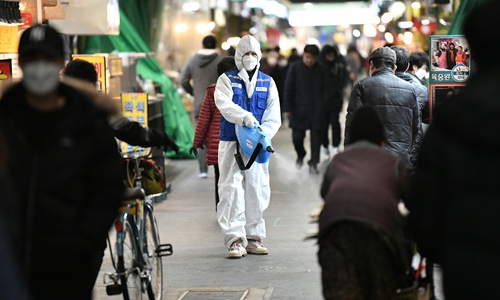HOME >> WORLD
Death of 17-year-old South Korean insufficient to prove coronavirus mutation: medical expert
By Zhao Yusha Source:Global Times Published: 2020/3/20 12:47:59

A worker from the Korea Pest Control Association, wearing protective gear, sprays disinfectant to help prevent the spread of the COVID-19 at a market in Seoul, South Korea on Monday. Photo: AFP
A South Korean teenager has died after being tested for the novel coronavirus several times and testing positive only once. His death may be the result of another strain of pneumonia, though panicked Chinese netizens have speculated that it signals virus mutation.
The 17-year-old high school student had been experiencing COVID-19 symptoms and on Wednesday died at a hospital in Daegu, 300 kilometers southeast of Seoul, South Korea's Yonhap reported on Thursday.
The report said the boy had been tested for the new coronavirus 10 times, and a urine sample tested positive for the virus only on the day of his death.
During a briefing on Thursday afternoon, the Korea Centers for Disease Control and Prevention said the teen's death was not linked to COVID-19.
This case alone is insufficient to indicate the mutation of the coronavirus, Peng Zhiyong, director of the intensive care unit at the Zhongnan Hospital of Wuhan University in Wuhan, told the Global Times on Friday.
Peng noted that there are many types of pneumonia. People who contract any type of pneumonia may show symptoms similar to those of COVID-19.
"But this case alerts us to the fact that young people without underlying diseases are vulnerable to the virus, and can even be killed by it," said Peng, adding that hopefully the teen's case would ring an alarm for countries advocating "herd immunity" or which remain reluctant to test all suspected cases.
Facing the rapid global spread of the virus, countries like Sweden and the UK have seemingly "surrendered," as the former announced it would stop testing suspected cases with mild symptoms, and the latter's controversial "herd immunity" strategy has ignited heated discussion worldwide.
Posted in: ASIA-PACIFIC